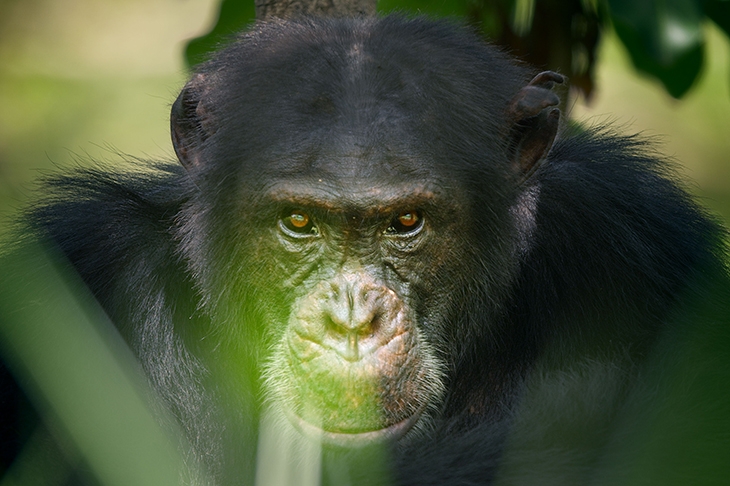The opening episode of BBC1’s Dynasties — the new Attenborough-fronted series from the Natural History Unit — introduced us to ‘a territory ruled by a strong and determined leader: an alpha male known as David’. Despite what you might think, though, this wasn’t a reference to the Natural History Unit itself, but to a troop of chimps in Senegal, whose power struggles unfolded on Sunday in an almost Shakespearean way.
As ever, Sir David started by demonstrating that he can still handle a spot of location shooting, in this case bellowing a few lines from a jeep speeding across the African savannah. But after that, he was again content simply to supply an authoritative voice-over and the occasional joke.
When we joined the chimp troop, the simian David’s leadership was already under attack from two whippersnappers called Luther and Jumpkin. The threat was serious enough for David’s close-ups to show him looking alternately worried and calculating; and for him to form an alliance with an older male by grooming him with affecting tenderness. (‘You scratch my back, I’ll scratch yours,’ the non-simian David duly chuckled.) This initially seemed to work — until David was so badly beaten up by his rivals that the following morning he appeared to be dead. Fortunately, in perhaps the programme’s most memorable moment, and certainly its most unashamedly theatrical, we then saw him twitch a toe, open an eye, drag himself to his feet and set off to reclaim his kingdom.
He succeeded too — so much so that Luther was soon begging for a forgiveness he never received: at which point you half-expected him to be offered the chimp equivalent of a bottle of whisky and a pearl-handled revolver. Before long, David’s re-established status meant that the females were flashing their swollen privates at him just like in the old days. Even so, he decided that he needed more alliances if he was to stay on top.
Needless to say, all this made for a spectacular watch. Yet, it was possibly just as well that David Attenborough did sound so authoritative — and was David Attenborough — because now and again the heretical thought occurred that if Dynasties had been on Channel 5, with an actor narrating, you might have wondered about its reliability. (Not since Walking with Dinosaurs have I spent so much time inwardly shouting ‘But how do you know?’ at the screen.) Was it definitely true, for example, that after his post-beating return David deliberately hid from the troop how wounded he was and ended up ‘fooling them all’? For that matter, wasn’t the whole narrative a bit too suspiciously shapely?
Happily, in the meantime, the David-related double entendres continued, reaching a climax in the making-of-the-programme section at the end. ‘David is very, very charismatic. He reminds me of Marlon Brando,’ said a camera operator — while, according to a scientist of chimp behaviour, ‘David has been alpha for almost double [the time] we’ve seen with other alphas. He’s been challenged a few times but he’s been able to hang on.’
Surprisingly — or maybe not — some of David’s tactics were much the same as those we saw in Inside the Foreign Office (BBC2, Thursday), where the permanent under-secretary Sir Simon McDonald began by explaining Britain’s need for alliances once it became apparent we could no longer rule alone.
The series is based on ‘a year of unprecedented access’ to its subject, which, as usual, appears to involve a trade-off. On the one hand, there’s well, that unprecedented access. On the other, this is clearly the Foreign Office as it would like to be seen: moral, ever-competent and unexpectedly diverse. ‘I’m not the lesbian ambassador,’ said our woman in Kiev. ‘I’m an ambassador who happens to be gay.’
So it was that we watched Britain leading the world in the fight against Russian perfidy and for human rights in Burma. Even Boris Johnson, the foreign secretary during filming, was on his best behaviour, departing from the script only when he suggested to his advisers on Syria that ‘we must accept that our plan, that Assad must go, has totally failed’.
Nonetheless, it was the suave Sir Simon who stole the show, with his habit of making unambiguous declarations that he’d then qualify in a way that left them considerably less unambiguous. (I think my favourite was, ‘The ends don’t justify the means. But we need to be sometimes more flexible about the means than we first thought.’)
Still, for a master diplomat he did rather give the game away towards the end. His knack at dinner parties, he told us, is to leave people feeling they’ve heard some genuinely confidential material — until they look back later and realise they haven’t really. For all the incidental pleasures along the way, this was exactly the effect of Inside the Foreign Office.






Comments